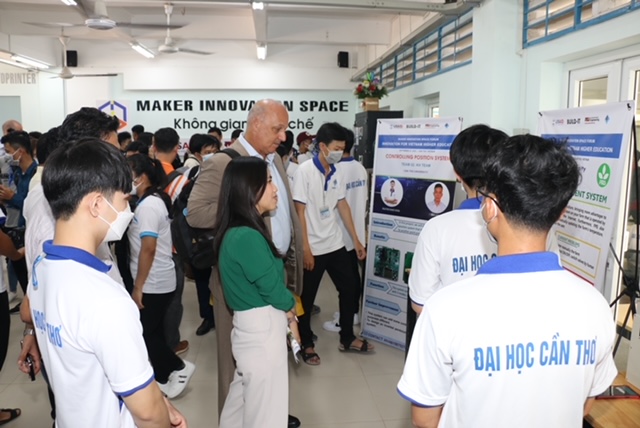 Society
Society

 |
| Participants look at ideas presented on the sidelines of the Maker Innovation Space forum. — Photo courtesy of the ASU |
CẦN THƠ — A forum bringing together experts in academia, industry, and government to explore the importance, successes and challenges of establishing and operating spaces for innovation was held in the Mekong Delta city of Cần Thơ.
The Maker Innovation Space forum, commonly referred to as MIS, also help participants explore how to utilise all the resources of innovation spaces to support changing the ideas of innovators both in the universities and the startup community into prototype and final products.
Through the MIS, students, faculty, and startups in the local community design, build and rebuild their ideas from prototype to final products to solve engineering-based problems for charities, schools and other not-for-profit organisations. This is a place where they tackle real-world problems today.
The forum, held on September 23, is the fourth part of the six-part Playbook forum series of the “Building University-Industry Learning and Development through Innovation and Technology” or BUILD-IT project.
The project is funded by the US Agency for International Development (USAID) and implemented by Arizona State University.
In the early 2000s, the Maker Movement inspired US universities to build makerspaces: multi-functional spaces with the workshops and tools to prototype innovations. Today, makerspaces are a critical learning space for multi-disciplinary applied projects.
Việt Nam’s early adopters struggled to meaningfully connect their spaces with Việt Nam’s large public education system. BUILD-IT mobilised its partners to push the innovator movement into Vietnamese universities and incubation centers.
For the past seven years, BUILD-IT has been helping Vietnamese universities establish and operate Maker Innovation Spaces in Đà Nẵng, HCM City and Cần Thơ. It has also been providing mentorship to universities for the management of the spaces.
Addressing the forum, Mitch Kirby, USAID Senior Education Advisor, said, “USAID BUILD-IT mobilised its partners to push the maker movement into Vietnamese universities and incubation centers. We supported the Saigon Hi-Tech Park (MIS SHTP), University of Đà Nẵng (MIS UD), and Cần Thơ University (MIS CTU) to develop model Maker Innovation Spaces."
"BUILD-IT mentored makerspaces at Lạc Hồng University (LHU) and our academic partners. These partners constitute the Maker Innovation Network. This forum endeavors to bring these experiences and successes to an audience who can bring this transformative opportunity to their own institutions," he said.
The tools and techniques BUILD-IT employs to prepare its partner universities for quality Maker Innovation Spaces are robust. With support and guidance, our partner universities, through the MIS, have supported students and the startup community throughout Việt Nam.
BUILD-IT’s goal is to enable sustainability of quality MIS in the long term, in part by increasing the access students and the community have to these maker innovation spaces.
While benefits of BUILD-IT’s programmes are obvious in real time, the real value of BUILD-IT is in its long-term support of higher education. To leverage seven years’ worth of programs, workshops, seminars, and training sessions, BUILD-IT created its Playbook Series to assist in sustaining BUILD-IT’s value long after the BUILD-IT programme ends in 2023.
The 2022 series of BUILD-IT forums celebrate key topics from this BUILD-IT playbook series, as prioritised by university partners. Topics in this playbook series include Institutional Accreditation, Project Based-Learning, Digital Immersion Learning, Program Accreditation (AUN-ABET), Industry Advisory Boards, Women in STEM, Maker Innovation Network, and Faculty Development and Active Learning. — VNS




